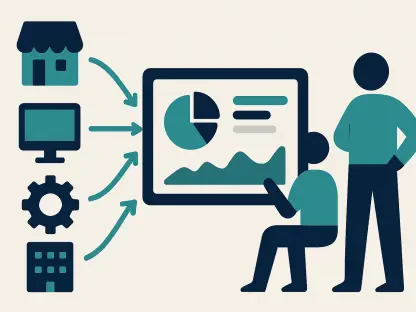In a world where digital innovation shapes nearly every sector, the insurance industry stands as a prime example of transformation driven by cutting-edge advancements, with technology redefining how policies are crafted, claims are processed, and customers are engaged in ways that were previously unimaginable. The rapid integration of tools like artificial intelligence, data analytics, and collaborative platforms has not only streamlined operations but also elevated customer expectations for efficiency and personalization. Events celebrating these strides, such as a prominent awards ceremony held recently in London, have spotlighted the remarkable ways in which tech is reshaping this traditionally cautious field. From automating complex underwriting processes to enhancing digital outreach, the industry is witnessing a paradigm shift that prioritizes speed, accuracy, and connectivity. This evolution reflects a broader commitment to harnessing innovation to tackle longstanding challenges, setting the stage for a future where technology and insurance are inseparably linked in delivering value and trust to stakeholders.
Emerging Trends in Insurance Technology
AI and Data Analytics as Game Changers
The adoption of artificial intelligence and data analytics has emerged as a cornerstone of progress within the insurance sector, fundamentally altering how companies approach decision-making and operational efficiency. Recognitions at recent industry awards have highlighted the pivotal role of AI in automating intricate tasks such as claims processing and risk assessment. Solutions that leverage machine learning algorithms are now capable of predicting outcomes with unprecedented accuracy, enabling insurers to mitigate risks more effectively. Companies leading in this space have been celebrated for their ability to transform raw data into actionable insights, thereby reducing costs and enhancing service delivery. This technological leap forward is not merely about replacing manual processes but about creating smarter systems that learn and adapt, ensuring that insurers remain agile in a competitive landscape where speed and precision are paramount.
Beyond the operational benefits, AI and data analytics are also redefining customer interactions by personalizing experiences at scale. Advanced tools analyze vast datasets to tailor policies and pricing models to individual needs, fostering greater trust and satisfaction among policyholders. This shift toward data-driven personalization allows insurers to anticipate customer preferences and respond proactively, a capability that was once unimaginable in such a regulated industry. Furthermore, the integration of real-time analytics ensures that adjustments to policies or claims can be made swiftly, addressing issues before they escalate. The emphasis on these technologies signals a broader industry consensus that embracing digital intelligence is no longer optional but essential for staying relevant and meeting the evolving demands of a tech-savvy clientele.
Collaboration Driving Innovation
Strategic partnerships between insurers, technology providers, and other stakeholders have become a powerful catalyst for innovation, as evidenced by accolades for collaborative efforts at recent industry events. These alliances are breaking down traditional silos, enabling the sharing of expertise and resources to address inefficiencies and enhance customer value. Collaborations recognized for improving efficiency have demonstrated how joint ventures can streamline processes like underwriting and policy management, cutting down on time and errors. Such partnerships often combine the strengths of established insurers with the agility of tech startups, creating solutions that are both robust and forward-thinking, ultimately benefiting end users through improved service delivery.
Equally significant is the focus on collaborations that prioritize customer experience, where technology is leveraged to create seamless, user-friendly interfaces and faster response times. These initiatives often involve integrating platforms that allow for real-time communication and feedback, ensuring that customer needs are met with precision and care. The recognition of such efforts underscores a growing realization within the industry that no single entity can drive transformation alone; instead, a networked approach amplifies impact. By fostering ecosystems where ideas and tools are shared freely, the sector is paving the way for innovations that are not just incremental but revolutionary, setting new standards for what insurance can achieve in a digital age.
Celebrating Diverse Achievements and Future Potential
Sector-Specific Technological Advancements
Innovation in insurance technology is not a one-size-fits-all endeavor, as different sectors like motor, property, and specialty lines require tailored solutions to meet unique challenges, a fact highlighted by recent industry recognitions. In the motor insurance space, technology has been pivotal in integrating telematics to monitor driving behavior, enabling dynamic pricing models that reward safe habits. Property insurance, on the other hand, benefits from advanced imaging and drone technology to assess damage with greater accuracy, speeding up claims processing. Specialty lines, often dealing with niche risks, rely on bespoke algorithms to underwrite complex policies. These targeted advancements ensure that technology addresses specific pain points, delivering impactful results that resonate with the distinct needs of each segment.
Moreover, the diversity of innovation across sectors reflects a broader trend of customization in insurance tech, where solutions are designed with precision to maximize relevance and effectiveness. Insurers leading in these areas have been acknowledged for pushing boundaries, setting benchmarks that inspire others to follow suit. This segmented approach also fosters healthy competition, encouraging continuous improvement and adaptation. As technology evolves, the ability to fine-tune applications for specific markets will likely become even more critical, ensuring that insurers can address emerging risks and customer expectations with agility. The focus on sector-specific progress underscores the industry’s commitment to leveraging tech as a tool for specialized excellence.
Honoring Human and Digital Excellence
Behind every technological breakthrough in insurance lies the human ingenuity that drives it, a theme celebrated through individual and organizational recognitions at recent industry gatherings. Awards honoring rising stars and outstanding achievements in technology highlight the dedication of professionals who design and implement transformative solutions. These accolades serve as a reminder that while tools like AI and analytics are powerful, their success depends on the vision and expertise of those steering their development. Such recognition not only motivates talent within the sector but also attracts new minds to contribute to its future, ensuring a pipeline of innovation.
In parallel, the spotlight on digital engagement through marketing and social media reflects the industry’s pivot toward modern communication strategies to connect with audiences. Excellence in these areas, as acknowledged by recent awards, showcases how insurers are using online platforms to build brand trust and educate consumers about complex products. This shift toward digital outreach complements technological advancements in operations, creating a holistic approach to transformation. Looking back, the strides made in blending human talent with digital tools have laid a strong foundation, and the next steps involve scaling these efforts to anticipate future needs, ensuring that both people and technology continue to drive the insurance industry toward greater heights.









